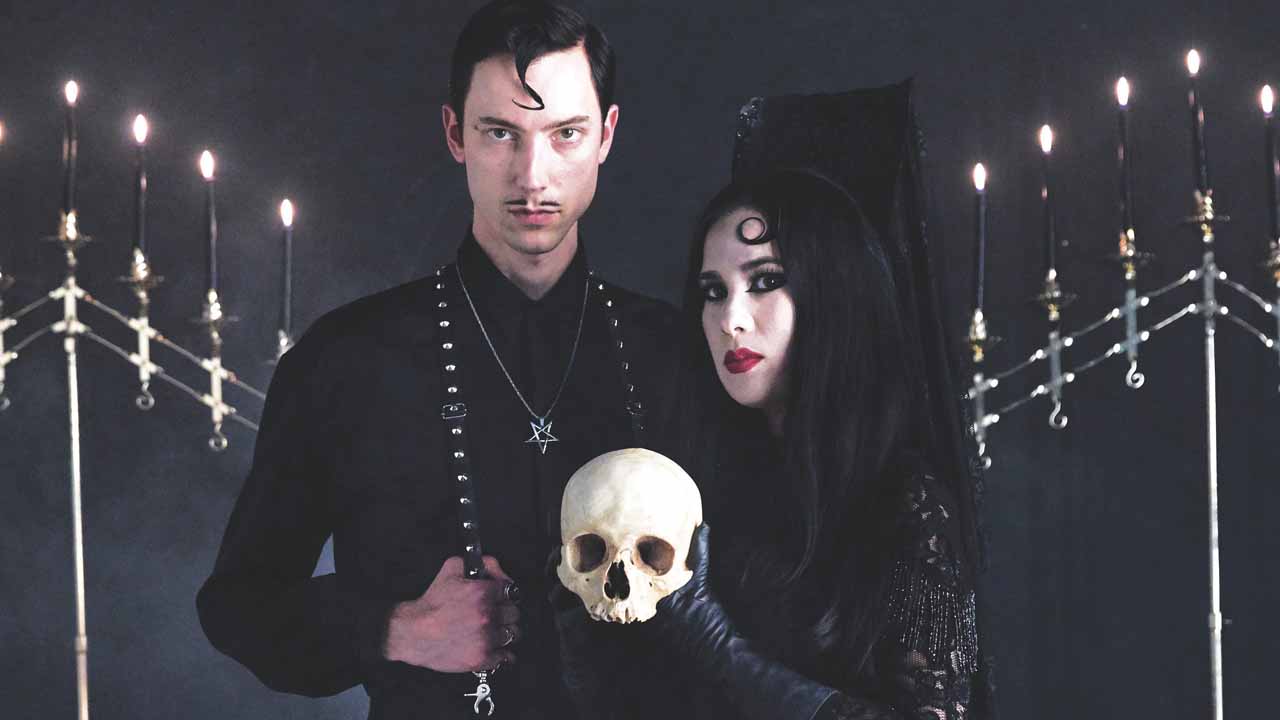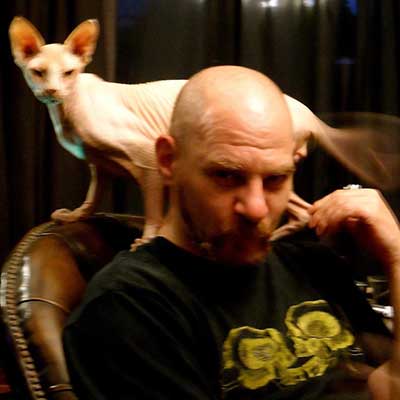The Dark Lord manifests in many forms – corpsepainted scourgers of humanity, wild-eyed brickies from Newcastle, masked papal emissaries – but a duo immersed in the lovelorn doo-wop music of the 50s and 60s might at first seem an unexpected choice, even by His inscrutable standards.
For married couple, and devout travellers along the left-hand path, Alexandra and Zachary James – aka Twin Temple – the combination of smoky, swinging grooves and paeans to Lucifer, the ways of the wicked and the liberating power of human sexuality isn’t just a natural one, it’s also a harnessing of the transgressive, mainstream-outraging roots of rock’n’roll.
“I think while, in the 50s, artists like Little Richard, Fats Domino and Ray Charles weren’t necessarily hailing Satan,” says Alexandra from her LA home, “mainstream culture deemed those artists as Satanic. They definitely demonised the music because of its transgressive nature, because you had Frankie Lyman dancing with a white woman on national TV, because they were tearing down those partitions during a time when the South was very much pervaded by [black vote-suppressing] Jim Crow laws, and was mired in racism. So in that way, we feel that the music was Satanic in the sense that we are using it, which is Satanism as a way to push back against outdated social norms, to herald the individual as a force for social change and equality, and just tear down the old guard.”
Having originally met through the West Coast punk rock scene, recognising each other as kindred souls both spiritually and musically with a shared love of classic, old-time rock’n’roll, Twin Temple was conceived on Halloween 2016. Their baldly-titled 2018 debut album, Twin Temple (Bring You Their Signature Sound… Satanic Doo-Wop), was recorded in a day and a half, using vintage, mono techniques. “That’s really how all of our heroes were recording back in the day,” says Alexandra. “There was no autotune, no multi-tracking; it was a band in a room with a microphone and you did your best to capture the energy that was at that moment.” It quickly sold out of its original run of 666 copies before finding a fitting home with Lee Dorrian’s Rise Above label.
But the power of the album goes far beyond exotica and retro-fetishism; for both of them, Twin Temple is the expression of an empowering philosophy that, for Alexandra, has its roots in early childhood.
“My experience growing up in America was as an outsider and not ever feeling like I was 100% this ideal version of what society expected of me,” Alexandra explains. “My mom’s actually British, and my dad is Korean, and I just remember distinctly that when I had to fill out tests at school or doctor’s forms and say what ethnicity are you and there was nothing for me. I always had to click the ‘other’ box. I got death threats from a neighbour who’d fought in the Korean war. I found a lot of community and empowerment in both magick and punk rock and rock’n’roll. So that was my refuge from a mainstream America that’s racist. I feel that I was born a Satanist, it’s an ideology set that’s ingrained within my nature. And when I started discovering the spiritual and philosophical traditions surrounding that, I was like, ‘Yep, that’s exactly how I feel.’”
From the album’s opening The Devil (Didn’t Make Me Do It), with Alexandra’s sulphur-stained, Amy Winehouse-esque vocals echoed in the line ‘Why don’t we die/And join the 27 club’, through Lucifer, My Love, a harmony-backed ballad you could imagine seeping through a David Lynch movie, and Sex Magick, whose accompanying video is awash with full-frontal nudity, Baphomet masks, performances of rites and lots and lots of blood, sexuality is Twin Temple’s prime battleground. But it’s given an added twist by being wedded to a musical style whose seemingly anodyne nature proved insidiously effective, its original lyrics about high school crushes bringing notions of lust and emotions that you’re meant to feel are illicit into mainstream culture.
“It was a repressive era for sexuality, especially towards women, at that time,” says Alexandra. “We hadn’t even had the 60s love explosion yet. So there were definitely some sexual entendres in a lot of the music going on, and I definitely think it was about this budding pushback against those repressive attitudes towards sex. And one aspect of the left-hand path, or Satanism, is the use of sexual energy and trying to free yourself of those restraints and destroying their societal taboos surrounding sex in the body. But when you’re using a saccharine musical format, it almost brings your ideas into sharper focus. There’s a kind of ‘push-pull’, and you’ll be like, ‘What? Wait a minute!’ Or you’re talking about what it means to be a woman in a very real and visceral way right now in Trump’s America, which is definitely something I consider when we’re writing the lyrics.”
Incredibly, this most unexpected of underground sensations managed to attract the attention of religious zealots and US far-right hatemonger, Alex Jones.
“We actually got targeted by this Christian hate group that was exposing the ‘fact’ that we murdered real babies and drink their blood on stage,” reveals Alexandra. “Alex Jones from Infowars devoted an entire segment specifically to us! We woke up the next morning and we had thousands of hate comments across all of our social media and death threats mailed to us.”
Ultimately, though, Twin Temple’s belief in the transformative power of ritual and individualism is an inclusive one.
“We’ve had a lot of women, members of the LGBTQ community, people of colour and people who just feel like outsiders tell us they love our message of inclusion,” says Alexandra. “That it makes them feel like they can come to our shows and be accepted there. That’s the goal. We want other outsiders and rebels to find their place in society and be able to live a fulfilled life where they can execute their will.”
Twin Temple are due to release their new album in 2021

